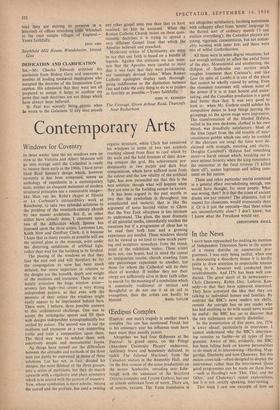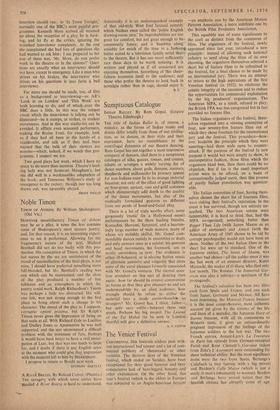In the News
I HAVE been reproached for making no mention of Independent Television News in the course of a recent diatribe on commercial pro- grammes. I was only being tactful; when one is denouncing a disorderly house it is hardly polite to draw attention to respectable tenants living in it however well conducted their establishments. And ITN has been well con- ducted. The great merit of its newscasters— Chris Chataway, Robin Day, Ludovic Ken- nedy—is that they have appeared interested. They have conveyed the idea that they are talking to individual homes and families. By contrast the BBC's news readers are chilly, remote. An outright ban on any reader who has had anything to do with sound news would be useful: the BBC has yet to discover that the two techniques are utterly dissimilar.
In the presentation of live news, too, ITN is away ahead; particularly in interviews. I cannot understand why the BBC's interview- ing remains so feeble—in all types of pro- gramme. Aware of this, evidently, the BBC has been falling back on known personalities to do much of its interviewing—Harding. M ug- geridge, Dimbleby and now Chataway. But this means cross-talk—often designed to display the interviewer, rather than the interviewed. Quite good programmes can he made on these lines —such as Harding's new 'This, That, and the Other,' and Chata way's recent explorations; but it is not. strictly speaking, interviewing.
This week I saw one example of how an interview should run: in 'In Town Tonight,' normally one of the BBC's most painful pro- grammes. Kenneth More arrived all steamed up about the reception of a play he is back- ing, and let fly at the critics, ignoring the wretched interviewer completely. At the end she complained she had lots of questions she had wanted to ask him : I am prepared to bet one of them was, 'Mr. More, do you prefer work in the theatre or in the cinema?' Ques- tions are exactly what an interviewer should not have, except in emergency. Like a man who drives on his brakes, the interviewer who drives on his questions is ipso facto a bad interviewer.
Far more use should be made, too, of film as a background to interviewing—as AR's 'Look in on London' and 'This Week' are both learning to do, and of which even the BBC does a little. In this way the subject about which the interviewer is talking can be illustrated—be it stamps, or strikes, or student movements. And in this way studio-itis can be avoided. It afflicts even seasoned performers, making the Brains Trust. for example. look as if they had all been in the hands of a taxidermist, and talk as if they had been warned that the bulk of their viewers are morons—which, indeed, if we watch that pro- gramme, I suspect we arc.
Two good plays last week, which I have no space to do more than mention. Theatre's lead- ing lady was not Somerset Maugham's, but she did well in a workmanlike adaptation of the book; and Tennessee Williams's study of resurgence in the rectory, though just too long drawn out, was agreeably played.
BRIAN INGLIS



































 Previous page
Previous page